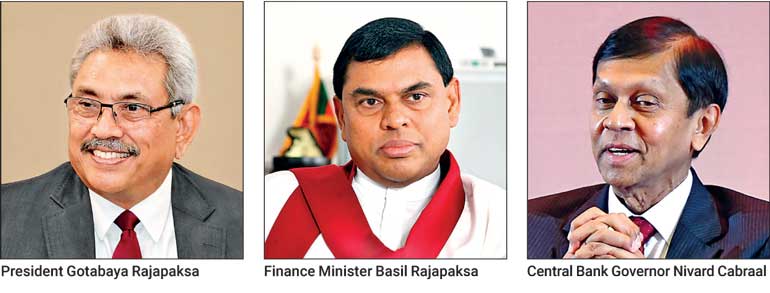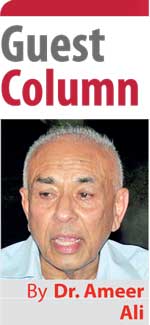Friday Feb 13, 2026
Friday Feb 13, 2026
Thursday, 31 March 2022 01:09 - - {{hitsCtrl.values.hits}}

 The debacle
The debacle
When the country’s economy contracted in 2020 amidst mounting debt, falling foreign reserves, creeping inflation and rising cost of living, and when life turned miserable to millions of Sri Lankans, the Government blamed the pandemic, and COVID-19 was made the scapegoat. With GR’s alternate path to develop the economy and homegrown solutions, establishment economists, Viyathmaga experts and the Central Bank were predicting a U-turn or V-turn in 2021 or 2022. All their predictions ended in no turn and the decline gained momentum.
Yet, scapegoating COVID-19 continues as CB Governor Nivard Cabraal sang the same tune in a video conference held two days ago to seek foreign portfolio and investments from UK. This is in spite of facts and figures produced by economists and analysts showing only Sri Lanka in the Asian region experienced an economic and financial debacle of such devastating magnitude, while others, which were also visited by the pandemic, registered an upward trend. Still, no one in the ruling circle dared to point finger at the man on top whose whimsical policy diktats and authoritarianism recked the heart of the economy.
Restarting with IMF
Having misled the country for two years and having disregarded advice from independent economists and experienced central bankers to change the track, a regime in utter desperation seems to have finally relented and called in the IMF for assistance. Cabraal, the man who went overboard in assuring imminent success for GR’s alternate path and homegrown solutions, while warning of the dangers in seeking IMF assistance, is now talking of resetting the economy and moving ahead with new impetus.
Does this mean that the Government is ready to implement all of IMF’s recommendations contained in its report, or pick and choose only those that would not jeopardise the political support base of the regime? For instance, how far would the regime go in eradicating corruption and what steps would it take to restructure its loss-making enterprises to make them earn enough at least to cover their expenses? These are two areas in which IMF would expect progress if the economy were to be reset and revived. Debt restructuring and macroeconomic stability alone would not be enough to reverse the trend.
In the meantime, GR has appointed a National Economic Council with 16 members in it of whom the majority are business magnates with only two economists. Cleaning corruption and undertaking structural reforms are fundamental to any revival but they would certainly disturb the cosy relations between private business interests and political establishment.
Scapegoat No. 2
There are also voices of criticism and complaint emanating from certain quarters of Sangha, targeting the finance minister for his leaning on IMF, India and the West. In fact, Basil Rajapaksa’s contact with IMF officials in Washington might have started even before he became Finance Minister and when he went to the US in mid-2021, apparently for medical consultation. On his return he was elevated to become the Minister of Finance. After submitting his maiden budget in November, he immediately flew to New Delhi to work out a financial deal with the Indian Government. That billion-dollar deal was made contingent upon Sri Lanka approaching IMF for help.
Apart from that, India has its own strategic interest in the island. Altruism is never the sole reason for economic assistance in international relations. And, what was promised by the minister in return for that deal is not known, except for a statement from him quoted in the media that there were no strings attached. Sangha, which historically carries negative views on Indo-Lanka relations, suspects the minister. This may be the reason why certain prelates are scapegoating him for the current troubles.
At least one head monk had urged the Prime Minister to shift Basil from the finance portfolio and place him elsewhere in the cabinet, as if that would solve the crisis. With all due respect to that monk, one should remind the prelates that economics and finance is not their forte to make recommendations to governments. Apart from encouraging a reshuffle, the Sangha is not prepared to withdraw its support to the regime.
Agonising impasse
On top of all this are the regular scenes of public protest and anger against the regime. Chronic shortages of consumer essentials, skyrocketing prices and crashing real income, had brought the multitude to streets demanding the regime to quit. People have decided that it is time for the Rajapaksas to quit. But they do not know how to make that happen. There are three more years before a General Election. In spite of all the rallies organised by NPP/JVP and SJB, which were mostly in metropolitan areas, there is an absence of a united opposition stitched together by an alternative and workable economic agenda to attract the discontented masses.
The Opposition seems to be waiting for the Government to collapse spontaneously, because of internal bickering and divisions within the coalition. This is highly unlikely because none of the constituent parties in the coalition is prepared to walk away for fear of legal action being pursued against their leaders. For example, the PCoI report is hanging like Damocles sword over the head of Maithripala Sirisena, the President of SLFP for his inaction to prevent the Easter massacre. In contrast, with support from the khaki and saffron armies the Government is well-aware of the fact that a united opposition would never eventuate.
With this agonising impasse, international powers which have a stake in the country also do not want Sri Lanka descending into anarchy with street marches and unruly protests. This may be the reason why India is said to be considering another billion-dollar credit line and urging the Government to open dialogue with TNA. At the same time, the Government is also said to be reworking the previously rejected MCC agreement with the US.
Unless the masses take upon themselves to topple the regime, the situation would continue for the next three years with a new normalcy. Unfortunately, in spite of IMF assisted resetting and impetus bandied about by the CB chief, and with yet more tied financial assistance from India, China and possibly the West, sustainable economic revival is years away for poor Sri Lanka.
Finally, it is worth reminding at this time of travail and tribulation that it had taken more than a decade to realise the enormity of the pyrrhic victory in 2009. As Ilankovadikal, an ancient Tamil poet, penned in his epic Cilappathikaram, “araciyal pizhaiththorku aram koottakum” (dharma will be the angel of death to those who err in governance).
(The writer is attached to the School of Business and Governance, Murdoch University, Western Australia.)